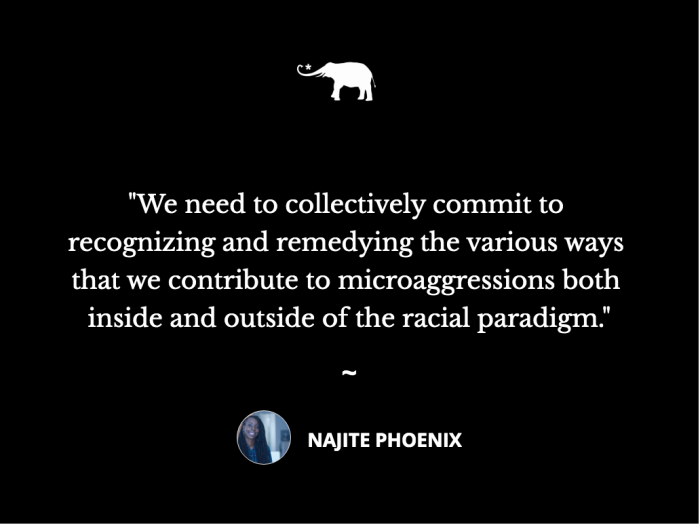View this post on Instagram
Over the last few years, “woo-woo” has become a popular term—used to refer to “unconventional beliefs regarded as having little or no scientific basis. Especially those relating to spirituality, mysticism, or alternative medicine.”
But here’s the thing. While it’s generally well-accepted and even used by practitioners to describe their own work, the term is majorly problematic.
According to Google, the term is explicitly described as a “derogatory noun or adjective.” And despite its open and seemingly innocent usage, as a brand comms analyst, here’s why I have to agree with Google.
As a phrase, “woo-woo” feeds into the divisive narrative of Western superiority. It subtly reinforces this idea that indigenous forms of knowledge, wisdom, or ways of moving through the world are inferior to their Western equivalent.
Although most people who use the term are simply trying to summarize what doesn’t typically belong to mainstream discourse on wellness, this marginalisation is harmful. Especially when we consider the common histories of race and gender-based genocide that have relegated these ideas and practices to the fringes of society. Salem witch trials, anyone? Women were literally burned at the stake for so much as a sniff of “alternative medicine.”
My ancestors experienced it too. Enslaved Africans who dared to continue their spiritual practices during the Transatlantic slave trade were killed. It’s well documented that one of the fundamental justifications for the Transatlantic slave trade (and colonialism) has always been this idea that Black and Brown people were inferior to their White, Western counterparts. And this was largely due to their indigenous spiritual practices and beliefs being written off as “evil” or “barbaric.” Today, particularly in the Caribbean (among descendants of those who were enslaved), African spirituality is largely still considered a taboo worth a beating.
Woo-woo is more than an issue of “sticks and stones.” And in any case, maybe, the old adage should read “sticks and stones will break your bones…but words will tell folk why they should hit you.” Taking the history into account, woo-woo carries a legacy that wellness brands need to confront.
On the surface, it presents as an innocent, yet edgy term that signals spiritual-adjacent beliefs. But a passive-aggressive bully is found hiding underneath, demanding: if you aren’t coming from a Western, scientific paradigm, you’ll need to overexplain, validate, or “poke fun” at yourself if you’d like to be accepted in mainstream spaces. And it’s this subtle layer of meaning that sticks and settles into our subconscious. So viewing it as a niche, a label for your audience, or using it in your website or social media copy, contributes to divisive discourse.
In my work supporting brands with anti-oppressive narratives, this is one set of discourse that is routinely overlooked. Though once it becomes clear to my clients, an irreversible light bulb moment takes place. Why? Because they realise that in their commitment to anti-oppression, they’ve become accustomed to only recognizing its popular forms. When working to tackle neo-colonial narratives, most only think about race and gender. But if we’re going to tackle oppressive narratives, we need to learn to recognize all of them.
The fact that “woo-woo” is often used by brands with a mainstream positioning or aesthetic, only adds to the issue. Let’s take yoga, for example; it’s still dominated by a young Western aesthetic despite its old Eastern roots. And while influencers of colour are doing a great job attempting to decolonize the space, terms like woo-woo undermine these efforts.
It’s akin to the paperbag club and modern manifestations of colourism. The idea of being black enough to be edgy, but white enough to be safe, becomes alternative enough to be interesting, Western enough to be legit.
The problem is, safe, Westernised forms are rooted in the indigenous cultures that they strategically choose to disassociate with. And this “choose what you can use” approach is a form of cultural appropriation, which disadvantages the culture’s original founders, while elevating the appropriators. A lack of honoring the original culture, combined with woo-woo-driven-marginalization makes this an issue that seriously needs to be addressed.
As a passionate discourse analyst, I’ve seen and experienced this in an exhausting number of ways. Recently, I read something to the effect of “If ‘universal abundance’ is your thing, we probably won’t be a good fit” while I was browsing a woman’s website. Let’s call her Hannah, and while I “get” what she was trying to do (confidently affirm the identity of her ideal clients), her attempt was painfully tone-deaf.
Being bold enough to affirm who we want in our circle shouldn’t contribute to “othering” groups or ideas that are already marginalized. Imagine the same page read, “If worshipping Allah is your idea of a life well-lived, we probably aren’t a good fit.” It simply would not swing. Hannah would be cancelled for Islamophobic rhetoric quicker than I could hit “close tab.” So why are we slowly allowing harmful rhetoric aimed at people’s world view in this new, “sassy,” “on-brand” form?
Now I’m not here to guilt-trip. Nor am I here to insist that you embrace any sample of ideas that are now classified as “woo.” But I am here to give you a shake. We need to collectively commit to recognizing and remedying the various ways that we contribute to microaggressions both inside and outside of the racial paradigm. Giving a pass to one form of oppression indirectly empowers all forms. A true commitment to anti-oppression means we can’t just pick and choose what is and isn’t okay to marginalize. It requires us to challenge unhelpful terms like “woo-woo” and other divisive discourse too.
You don’t have to find the perfect alternative overnight. You could simply start by calling it what it is: natural, spiritual, indigenous, old-age, or something a little more creative. But more important than the term itself are the connotations that become attached.
So ask yourself: Are you using it neutrally? Are you using it as a form of endearment? Or are you subtly implying that what you’re referring to requires extra effort to legitimize its worth in the eyes of the dominant culture?
~

 Share on bsky
Share on bsky







Read 5 comments and reply